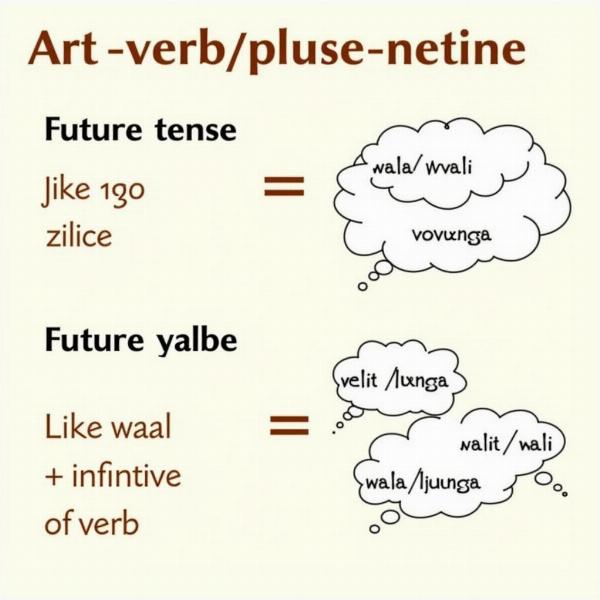Understanding the nuances of Hindi verb conjugation is crucial for effective communication. One common point of confusion for learners is the future tense, particularly the word “jaunga”. This article will provide a comprehensive explanation of “jaunga meaning in hindi,” exploring its various uses, grammatical contexts, and cultural implications.
Deconstructing “Jaunga”: Understanding Its Core Meaning
“Jaunga” is the first-person singular masculine future tense form of the verb “jana,” which means “to go.” So, the most direct translation of “jaunga” is “I will go.” However, its usage extends beyond simply expressing future movement. It can also indicate intention, probability, and even a sense of obligation.
Beyond “I Will Go”: Exploring the Nuances of “Jaunga”
While “jaunga” primarily means “I will go,” it’s essential to understand its broader implications. For instance, “Main kal bazaar jaunga” translates to “I will go to the market tomorrow,” clearly indicating a future action. But “jaunga” can also express intention, as in “Main yeh kaam karne ki koshish karunga, par pakka nahi keh sakta ki main kar paunga ya nahi. Lekin agar main kar paunga to zaroor kar jaunga” meaning, “I will try to do this work, but I cannot say for sure whether I will be able to do it or not. But if I can do it then I will definitely do it.” This suggests a willingness or plan to perform an action, even if the outcome is uncertain.
Furthermore, “jaunga” can imply probability. Imagine someone saying, “Agar baarish hogi, toh main ghar par hi jaunga,” which translates to “If it rains, then I will stay at home.” This doesn’t necessarily mean the speaker is definitively staying home; it indicates a likely course of action based on a condition.
Grammatical Context: Conjugating “Jana” in the Future Tense
Understanding the grammatical context of “jaunga” is crucial. Here’s how “jana” conjugates in the future tense:
- Main jaunga (मैं जाऊँगा): I will go (Masculine)
- Main jaungi (मैं जाऊँगी): I will go (Feminine)
- Hum jayenge (हम जाएँगे): We will go (Masculine)
- Hum jayengi (हम जाएँगी): We will go (Feminine)
- Tum jaoge (तुम जाओगे): You will go (Masculine, singular/informal)
- Tum jaogi (तुम जाओगी): You will go (Feminine, singular/informal)
- Aap jayenge (आप जाएँगे): You will go (Masculine, plural/formal)
- Aap jayengi (आप जाएँगी): You will go (Feminine, plural/formal)
- Vah jayega (वह जाएगा): He will go
- Vah jayegi (वह जाएगी): She will go
- Ve jayenge (वे जाएँगे): They will go (Masculine)
- Ve jayengi (वे जाएँगी): They will go (Feminine)
Cultural Implications: “Jaunga” in Everyday Conversation
In Indian culture, “jaunga” is often used in casual conversations, reflecting a sense of informality and close relationships. It’s common to hear friends and family members using “jaunga” when making plans, sharing intentions, or expressing hopes for the future.
Will I Go? Using “Jaunga” in Questions
“Jaunga” can also be used in interrogative sentences. For instance, “Kya tum kal mere saath film dekhne jaoge?” translates to “Will you go to watch a movie with me tomorrow?” This illustrates how “jaunga” (and its conjugated forms) can be employed to seek confirmation or inquire about future plans.
Jaunga and its Alternatives: Expressing the Future in Hindi
While “jaunga” is a common way to express the future tense, Hindi offers other options. For example, the construction “wala/wali/wale + infinitive of verb” can indicate imminent action. “Main jane wala hoon” means “I am about to go.” This construction suggests a more immediate future compared to “jaunga.”
 Alternative ways to express future tense in Hindi
Alternative ways to express future tense in Hindi
Conclusion: Mastering “Jaunga” for Fluent Hindi
Understanding the meaning and usage of “jaunga” is essential for anyone learning Hindi. This article provided a thorough exploration of “jaunga meaning in hindi”, covering its core meaning, nuances, grammatical context, and cultural implications. By mastering this crucial verb form, you’ll be well-equipped to navigate the complexities of Hindi conversation and express yourself accurately and effectively.
FAQ
-
What is the literal meaning of “jaunga”? The literal meaning of “jaunga” is “I will go.”
-
Can “jaunga” be used to express something other than physical movement? Yes, “jaunga” can also express intention, probability, and a sense of obligation.
-
How does “jaunga” conjugate for different pronouns? Refer to the table in the “Grammatical Context” section for a complete conjugation of “jana” in the future tense.
-
Is “jaunga” used formally or informally? “Jaunga” is generally used informally, particularly in conversations with friends and family.
-
What are some alternative ways to express the future tense in Hindi? Alternatives include using the construction “wala/wali/wale + infinitive of verb” to indicate imminent action.
-
Why is understanding “jaunga” important for learning Hindi? Mastering “jaunga” is crucial for accurate and effective communication in Hindi, allowing you to express future actions, intentions, and probabilities.
-
Where can I find more resources for learning Hindi verbs? You can explore online dictionaries, grammar books, and language learning platforms.
Meaning-Hindi.in is your one-stop solution for all your Hindi translation needs. We offer a wide range of professional translation services, from business and legal documents to technical manuals and website localization. Our expert translators ensure accuracy, cultural sensitivity, and timely delivery. Whether you need to translate documents for educational purposes, commercial ventures or legal matters, our team is equipped to handle your requests with precision and expertise. Contact us today at [email protected] or +91 11-4502-7584 to discuss your translation requirements. Meaning-Hindi.in is dedicated to bridging the language gap and facilitating seamless communication across cultures.